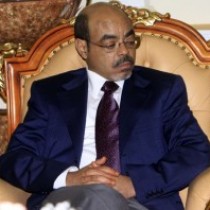
Ethiopian leader Meles Zenawi dies aged 57
It announced on Tuesday that the 57-year-old prime minister died from a sudden infection while recoveringfrom the illness at a hospital abroad.
“Prime Minister Zenawi suddenly passed away last night. Meles was recovering in a hospital overseas for the past two months but died of a sudden infection at 11:40,” state television said.
State media said Hailemariam Desalegn, deputy prime minister,would be the acting prime minister.
Zenawihad been in power since overthrowing Mengistu Haile Mariam’s military junta in 1991.
He served as president from 1991 to 1995, when he became prime minister.
He was credited with Ethiopia’s economic boom in the past decade, with economic growth shooting from 3.8 per cent in the 1990s to 10 per cent in 2010.
Under criticism
On the domestic frontZenawi would regularly come under fire from human rights organisations who accused him of gross abuses against ethnic minorities, including Ethiopia’s ethnic Somalis in the eastern Ogaden region where rebels have fought a long running insurgency.
Similar ethnic conflicts have boiled among the Oromo people in central Ethiopia, the Afar in the far east on the border with Eritrea, and the Anuak people near the border with South Sudan.
Zenawi would brook no criticism: in 2005, nearly 200 people died in a crackdown on demonstrations by the opposition, who accused Meles of rigging elections.
But some Ethiopians argued that he did what was necessary to stabilise the vast and ethnically diverse state.
The much criticised 2009 anti-terrorism law, which rights groups have said is far too vague and has been used to quash freedom of speech and peaceful political dissent, has seen multiple opposition figures and journalists, including two Swedes, jailed for lengthy terms.
In the wider region, Zenawi was never afraid to make full use of Ethiopia’s powerful and well-equipped army.
Border conflict
After overseeing the independence of Eritrea from Ethiopia in 1993 — run by fellow ex-rebel fighters who had also fought to topple Mengistu -Zenawi returned to war, with a 1998-2000 border war leaving tens of thousands dead.
A peace deal led to a tense standoff, withZenawi refusing to pull troops from the border town of Badme, even after an international court ruled the town belonged to Eritrea.
The town has been the source of festering discontent between the nations ever since.
Zenawialso invaded longtime Ethiopian foe Somalia, sending troops and tanks to topple an Islamist regime in 2006, before pulling out the following year in the face of guerrilla attacks.
He sent Ethiopian troops back into Somalia in 2011.
Illness speculation
WhileZenawi was regularly singled out by rights groups as one of the continent’s worst human-rights predators, some Western observers took the pragmatic view that Ethiopia and the region needed Meles where he was.
Former US president Bill Clinton once called him a “renaissance leader”, while a leaked 2009 US diplomatic cable described him as “quiet, deliberative and certainly not a ‘man about town’”, adding he was a “voracious reader and very introspective.”
Unlike many of his fellow African leadersZenawi never earned a reputation for having a taste for luxury.
In the final decade of his lifeZenawi challenged the world’s powerful and spearheaded an African push for more fairness in key climate change talks.
Speculation that Zenawiwas seriously ill grew after he failed to attend an African Union summit in the Ethiopian capital, Addis Ababa, last month.
Diplomats in Addis Ababa had saidhe was being treated in Brussels for an undisclosed illness, while others said he was in Germany.
Ethiopia’s government said last month thathe was taking a break to recover from an unspecified condition.
Medical studies
Born on May 8, 1955,Zenawi abandoned his medical studies before he turned 20 to join the rebel Tigray People’s Liberation Front (TPLF) to fight Mengistu.
After taking over the TPLF’s leadership he forged a broader coalition with other regional movements to make up the Ethiopian People’s Revolutionary Democratic Front (EPRDF), now the country’s ruling party.
With US backing, the rebellion toppled Mengistu’s dictatorship in 1991, a year after Meles abandoned Marxism.
Zenawi, who earned degrees in business from Britain’s Open University and in economics from Erasmus University in The Netherlands, used to list his hobbies as reading, swimming and tennis.
Zenawiwas married to a former Tigray rebel fighter Azeb Mesfin, a member of parliament, women’s activist and businesswoman, with whom he had three daughters and one son.
Source: Aljazeera
Leave a comment
| Copyright © 2009 - 2025 Sunatimes News Agency All Rights Reserved. |
| Home | About Us | Diinta | Reports | Latest News | Featured Items | Articles | Suna Radio | Suna TV | Contact Us |
 0
0 









Ethiopian leader Meles Zenawi dies aged 57
After overseeing the independence of Eritrea from Ethiopia in 1993 — run by fellow ex-rebel fighters who had also fought to topple Mengistu - Zenawi returned to war, with a 1998-2000 border war leaving tens of thousands dead.